(L276) Complex Sentences (Subordinating Conjunctions) Bundle
Original price was: $47.92.$43.00Current price is: $43.00. including GST
Good places to start helping students with complex syntax include:
-
- conjoined sentences (e.g. sentences with two ideas joined by “but”, “and” or “or”) (see our FANBOYS Coordinating Conjunctions Bundle); and
- complex sentences with early developing subordinate conjunctions, such as “because”, “if”, “when” and “while”.
This 160+ page no-prep bundle of subordinating conjunctions provides scaffolded practice in formulating sentences containing key 8 conjunctions – ‘because’, ‘if’, ‘when’, ‘while’, ‘before’, ‘after’, ‘until’ and ‘unless’. Over 290 scaffolded sentences with both picture and orthographic cues – all tried and tested in our speech pathology clinic.
Description
Complex syntax skills have a big impact on later academic success (Scott & Windsor, 2000). We need complex grammar for oral and written expression, as well as conversational success in everyday activities, e.g. during playground games and sport.
From Kindergarten, children are expected to follow directions; to engage in classroom discussions; to answer higher-level questions; to summarise and explain complicated material; to reason verbally; and to write using a variety of “genres” (e.g. stories, procedures, opinions/arguments) requiring sophisticated language structures and vocabulary, including complex syntax.
Good places to start helping students with complex syntax include:
-
- conjoined sentences (e.g. sentences with two ideas joined by “but”, “and” or “or”) (see our FANBOYS Coordinating Conjunctions Bundle); and
- complex sentences with early developing subordinate conjunctions, such as “because”, “if”, “when”, “while”, “before”, “after”, “until” and “unless.”
Many people – including people learning English as an additional language and/or people with language and other learning difficulties – find complex sentences particularly difficult.
This 150+ page no-prep bundle of subordinating conjunctions provides scaffolded practice in formulating sentences containing key conjunctions – ‘because’, ‘if’, ‘when’, ‘while’, ‘before’, ‘after’, ‘until’ and ‘unless’.
Recent research tells us that (a) typically developing children don’t figure out simple sentences before moving to complex ones: and (b) typically developing children begin to produce complex syntax when they are 2 years old, soon after they start combining words; by 3 years of age, typical learners produce complex sentences.
This bundle includes 8 of our most popular Complex Sentence Builders. The full sequence includes:
-
- because sentences (e.g. The boy ate the sandwich because he was hungry.);
- if sentences (e.g. “If I am sick tomorrow, I will stay home from school.”);
- when sentences (e.g. “When I go for a run, I listen to music.” or “When I get home, I will have a shower.”);
- while sentences (“e.g. The man juggled while riding a unicycle.”);
- before sentences (e.g. “Before you go to bed, brush your teeth.”);
- after sentences (e.g. “The girl did her homework after finishing dinner.”);
- until sentences (e.g. “The children played outside until it started to rain.”); and
- unless sentences (e.g. “Unless you finish your dinner, you cannot have any dessert.”).
8 no-preparation, ready to use resources, all tried and tested in our speech pathology clinic. All in all, over 290 scaffolded sentences with both picture and orthographic cues. And all for a discounted price!
Principal sources:
-
- Barako Arndt, K. & Schuele, C.M. (2013). Multiclausal Utterances Aren’t Just for Big Kids. Topics in Language Disorders, 33(2), 125-139.
- Brown, R. (1973). A first language. Cambridge, MA: Harvard University Press.
- Eisenberg, S.L. (2013). Grammar Intervention, Topics in Language Disorders, 33(2), 165-178.
- Kahmi, A.G. (2014). Improving Clinical Practices for Children with Language Disorders. Language, Speech, and Hearing Services in Schools, 45, 92-103.
- Schuele, C. Melanie (2013). Foreword: Beyond 14 Grammatical Morphemes Toward a Broader View of Grammatical Development, Topics in Language Disorders, 33(2), 118-124.

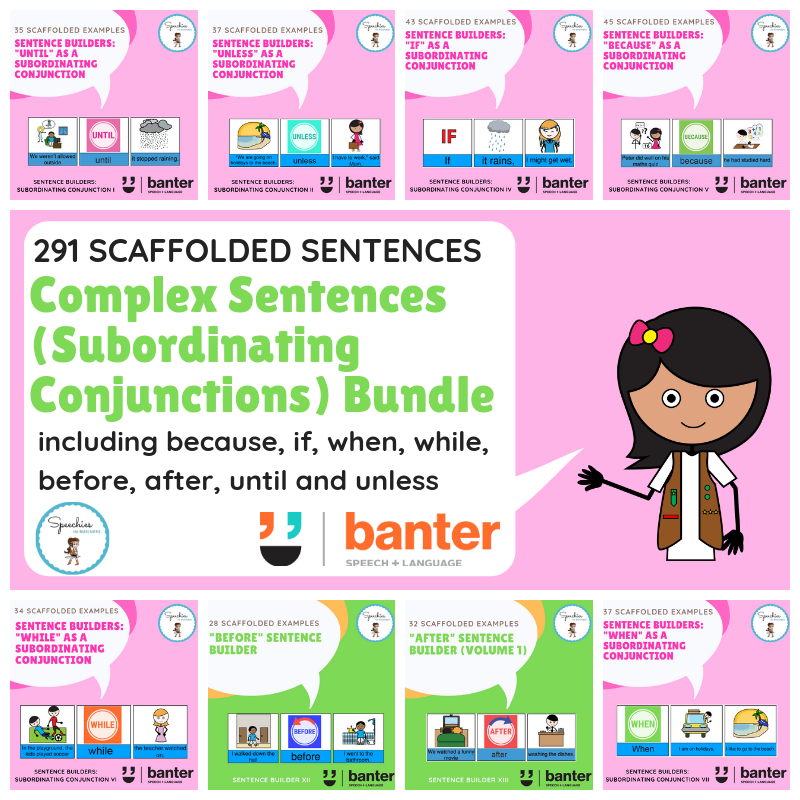

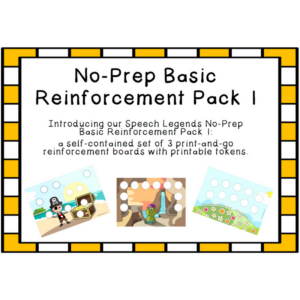
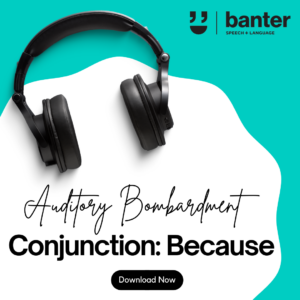
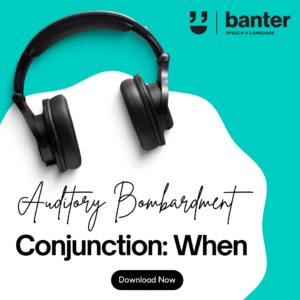
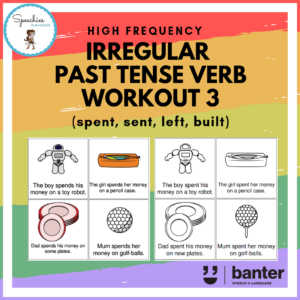
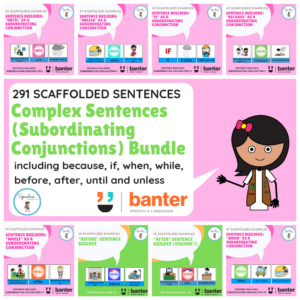
Reviews
There are no reviews yet.